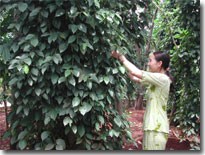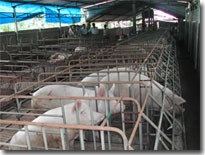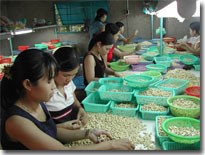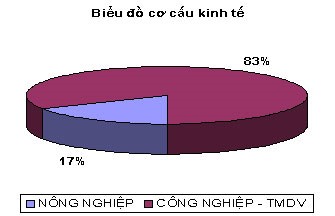1. Agriculture:
+ Cultivation: Long Giao commune has 2,756.93 ha of
agricultural land, accounting for 85.4% of the total natural land area; the
rubber-planting area is 1,727 hectares, accounting for 62.64%; the agricultural
land area under the management of the commune is 1,029.93 hectares mainly
planted with high-yield fruit trees, rubber trees and cashew trees.
+ Livestock: Long Giao’s livestock sector is
developing stably. In particular, raising cattle and pigs is the most developed.
Since the bird flu spread across the country, the commune’s poultry population
has grown and reached 14,900 heads, accounting for 59.8% as planned. In
addition, local residents work many other jobs such as raising rabbits, goats
and Chinese soft shell turtles to earn extra income.

Take caring of pepper gardens

Business facilities offer many different breeds of
pigs
2. Services and Trade:
In recent years, services and trade have grown
rapidly, especially the growth of food and beverage services, consumer goods and
entertainment, which are mainly concentrated along National Highway 56 and Long
Giao spontaneous market. Although there have been no networks for trading
agricultural equipment and devices, more than 100 households businesses have
paid taxes to the commune.
3. Agriculture and small industry and
handicrafts:
Long Giao commune has the National Highway 56 with a
length of more than 7 km, which is very convenient for traveling and exchanging
goods. Currently, there are 4 agricultural processing enterprises, creating jobs
for nearly 1,000 locals and 5 points supply welding and forging services for
agricultural tools, meeting people’s production and business needs.

4. Economic structure chart:

5. Education:
Long Giao commune has 2 primary schools with 39
teachers, 3 staffs and 751 students; and 1 kindergarten with 3 classes, 3
teachers and 74 children. The school library is fully equipped and recognized as
a national standard library.
6. Health:
The local clinic is fully equipped with 1 doctor, 2
nurses and 1 experimental technical staff. The clinic always ensures an adequate
supply of drugs for patients and community health care programs such as
universal immunization programs for children, hepatitis vaccination programs,
family planning programs and so on together with functional authorities in
launching campaigns to kill mosquito larvae and prevent dengue fever as well as
preserve food safety and hygiene throughout the commune.